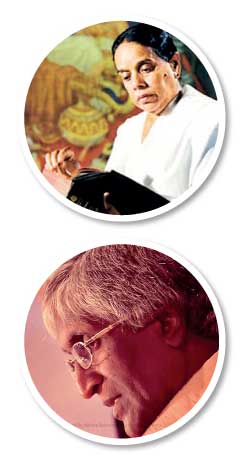
Regi Siriwardena, who wrote about writers, directors, playwrights, novelists, and mavericks, once wrote on Willliam Wordsworth and Samuel Coleridge. Here’s what he noted:
‘From sympathy and enthusiasm through disillusionment to fear and hostility, strengthened by patriotic sentiment once the war commenced – the gamut of emotions that the two poets underwent paralleled the general movement in the reactions of the upper and middle classes in England.’
Siriwardena was writing about the French Revolution, and how the initial ardour for the revolutionists soured, turning into horror and then reactionary hysteria, in England. Not even the poets were spared: overnight, both Wordsworth and Coleridge, who were in their twenties when the Monarchy was overthrown and had celebrated the social and economic uprisings it compelled, became jingoists in the most conservative sense of that term. Robert Browning, in arguably the greatest single poem in English summing up the rage of the revolutionist against the turncoat, described this shift in “The Lost Leader” (“Just for a handful of silver he left us / Just for a riband to stick in his coat”).
Some of the greatest poets – one can include not just Wordsworth and Coleridge, but also Pushkin and Auden and Spender and Day Lewis – were either reactionaries or turncoats, whose youthful feelings of exuberance at social change slowly, but gradually, turned over. What matters today, however, is not whether they rejected the labels we had, once upon a happier time, pasted on them, but whether those labels still befit the poems and the lyrics and the songs and ditties they composed and wrote when they were still in their youth, as idealistic and revolutionary as you and I are today. I don’t think there’s any point lambasting them for their later reversal; after all, we have no moral right to pinpoint such reversals given our own renouncement of revolutionary fervour.

(In Delovak Athara the protagonist speaks for all of us in this sense: “Everyone’s a socialist at 20!”) In Sri Lanka the revolutionary poet was, at his or her most popular and populist, the nationalist poet: Tibet S. Mahinda Thera comes to mind at once. The conditions in Sri Lanka were not comparable to those in continental Europe, since here the main symbol of oppression wasn’t a rotund, idle king and his consort but a bunch of colonialists and their brown lackeys who lived in their own privileged quarters at the exorbitant cost of the rest of the country. The reawakening that the likes of Mahinda Thera brought about, consequently, was dependent on nationalist rhetoric, to be echoed many, many decades later by a song which spoke of the kind of love for one’s country that he frequently had:
It’s interesting, then, that in about seven or eight cases out of 10, even today, the conventional Sinhala song about oppression, exploitation, and misery celebrate the impermanence of suffering, echoing the Buddhist outlook on the ata lo dahama:
That last song (“Rae Wada Muraya”), performed by Sunil Edirisinghe, was written by Bandula Nanayakkarawasam. I met Bandula more than a year ago, when I was attached to another paper and had to interview him. (The interview, incidentally, was never published.) Given that my knowledge of Sinhala poetry was, at best, abysmal, I asked him as to how one can trace its influence in the choice of most of our lyricists to affirm, rather than rebel against, suffering in the same way the early Wordsworth had. Obviously, the answer to this had to bring up one name. Bandula brought it up.
“When Sunil Ariyaratne wrote ‘Perahera Enawa’, he didn’t depict the usual pageant, with people gazing on at the nilames and the kasa karayas with admiration. He brought up a rift between those nilames and those kasa karayas. You can argue that the function of a song is to entertain, to give us some reason to be overjoyed. I would agree, but then there must be at least some lyricists, some performers, who see in music and literature a potential to unearth the political, the social. I may or may not be able to indulge in the political the way Ariyaratne did, but that doesn’t diminish my respect for him.”
The great achievement of the political lyrics of Sunil Ariyaratne and the political songs of his musical consort, Nanda Malini, was their ability to unearth the social reality behind the colourful facade. They do this in “Perahera Enawa”, which unlike Wordsworth’s later poetry and like William Blake’s best poetry undresses what’s perceived, and celebrated, in favour of what’s real, substantive, and all too common. Consider the opening:
The sense of grandeur in the first two verses is roundly negated by the third. As the song moves on, thanks to Nanda Malini’s dexterous ability to convey both infatuation and irony through her voice, that sense of negation gets more potent, more discernible:
The truth is, as far as I can make it out with my knowledge of the field, that the classical Sinhala poet did not bother himself with the kind of revolutionary rhetoric that Ariyaratne and Malini did. It’s their penchant for routing tradition, without flouting it outright, which crops up in gushes and torrents in their most acerbic work. Consider the following:
The last line brings out a point of comparison between the contemporary polity’s act of yielding to superstition and the classical era’s conflict between Buddhism and the many variants of Hinduism and Jainism: essentially, the intrusion of superstition on the temple of reason. The attempt by the poet to bring together the temple and reason, incidentally, is another sign of his political outlook: for the Marxist in Sri Lanka, the only clergy worth reckoning with were those who dabbled in rationalism: Walpola Rahula, Kotahena Pannakitti, and those denounced by D. S. Senanayake as political bhikkus.
“Budu Himiyantath Kaliyugaye”, the opening to which I quoted above, was not part of Nanda Malini’s most fiercely political album, Pawana, but rather of the earlier Sathyaye Geethaya, which also had “Perahera Enawa” and where she and Ariyaratne were less fierce, less overt. The fact that “Perahera Enawa”, “Sakura Mal Pipila”, and “Sukiri Batillange Geethaya” are celebrated, even today, in favour of and over the Pawana songs brings up a whole new debate about the rift between the political and the aesthetic in music, and indeed in the arts in general. Malinda Seneviratne once observed to this effect that the Pawana songs were dated (“for the most”) and hence were not as remembered or timeless as Malini’s earlier work on childhood, adolescence, and repudiated love.
Malinda’s contention about the timelessness or lack thereof of a particular epoch of a particular artist is a variation on the largely bourgeois debate between the timelessness and the specificity of a work of art. In conventional Marxist dialectics, there’s no production without consumption, no consumption without production. What is true for economics is true also for literature, music, even the cinema: a novel or a play becomes a novel or a play by its act of being consumed by audiences. When the ardent Marxist seeks to analyse an objet d’art on the basis of the social processes which bred it, he or she divorces the act of interpretation from the production of new, subsequent meanings.
I return to Regi Siriwardena with a question he once raised: “Does Maname mean for us what it meant for audiences in 1956?” The question, bewildering if not downright redundant to some, was a response to the ardent Marxist’s rubbishing of classical art, in particular Greek art: “It is because these texts have been most susceptible to continual transformation of meaning that they have survived.” In other words, the best art is not conditioned by notions of timelessness and specificity; on the contrary, the best art survives continual change, while yielding to it and at times even defying the intentions of its authors. (Derrida wrote on the death of such authors; Lester James Peries denied its relevance, while the more political Dharmasena Pathiraja, in an interview I had with him, affirmed it as preferable to the bourgeois notion of the director as a definitive auteur.)
What Malinda observed about Malini’s songs is, for the most, contradicted by their continuing relevance today. “Yadamin Banda Vilangula”, to give just one example, was written as a response to the atrocities of the then government led by the United National Party, and was frequently broadcast in the run-up to the January 8 election in 2015.
But I digress. Here are Malinda’s views on the matter, in his own words: “I cannot help feeling that a cart was put before a horse; that literature was approached through politics and therefore only its ‘purely political’ message was extracted and its larger call for recognition and exploration of humanity was missed or ignored or both.”
Humanity: the ardent Marxist might rubbish that as indicative of the writer’s bourgeois inclinations, just as it is of those who talk about the timelessness of a text, but to me the counterargument is quite simple, really: was it not humanity that mobilised an entire population through her verses, some of which were more effective than all the humanistic poetry in the world in substituting active participation for passive affirmation?
That last song (“Seethala Polawama) was used by detractors of the former regime, incidentally; by those who vouched for the UNP, the JVP, and the TNA, against the imprisonment of Field Commanders and Chief Justices. Not timeless enough? I think not.
And so, in the general order of things, in my book, they remain timeless enough. Where their writer and performer went wrong (because yes, they did go wrong, right after Pawana) is grist for another article. Next week. For now though, I am done.
 Regi Siriwardena, who wrote about writers, directors, playwrights, novelists, and mavericks, once wrote on Willliam Wordsworth and Samuel Coleridge. Here’s what he noted:
Regi Siriwardena, who wrote about writers, directors, playwrights, novelists, and mavericks, once wrote on Willliam Wordsworth and Samuel Coleridge. Here’s what he noted:  (In Delovak Athara the protagonist speaks for all of us in this sense: “Everyone’s a socialist at 20!”) In Sri Lanka the revolutionary poet was, at his or her most popular and populist, the nationalist poet: Tibet S. Mahinda Thera comes to mind at once. The conditions in Sri Lanka were not comparable to those in continental Europe, since here the main symbol of oppression wasn’t a rotund, idle king and his consort but a bunch of colonialists and their brown lackeys who lived in their own privileged quarters at the exorbitant cost of the rest of the country. The reawakening that the likes of Mahinda Thera brought about, consequently, was dependent on nationalist rhetoric, to be echoed many, many decades later by a song which spoke of the kind of love for one’s country that he frequently had:
(In Delovak Athara the protagonist speaks for all of us in this sense: “Everyone’s a socialist at 20!”) In Sri Lanka the revolutionary poet was, at his or her most popular and populist, the nationalist poet: Tibet S. Mahinda Thera comes to mind at once. The conditions in Sri Lanka were not comparable to those in continental Europe, since here the main symbol of oppression wasn’t a rotund, idle king and his consort but a bunch of colonialists and their brown lackeys who lived in their own privileged quarters at the exorbitant cost of the rest of the country. The reawakening that the likes of Mahinda Thera brought about, consequently, was dependent on nationalist rhetoric, to be echoed many, many decades later by a song which spoke of the kind of love for one’s country that he frequently had: